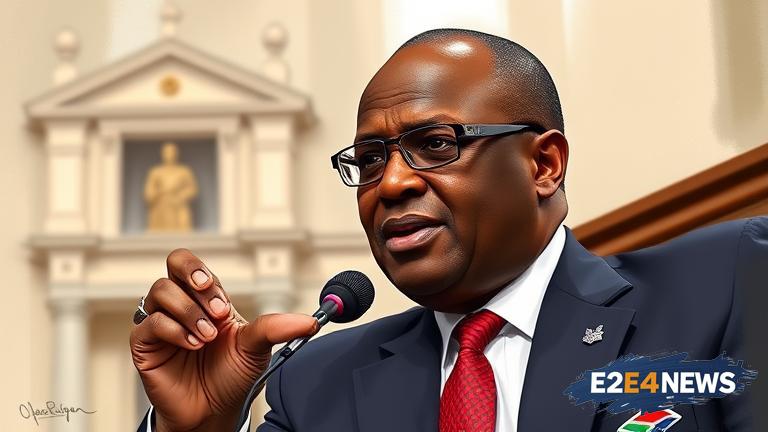Deputy President Paul Mashatile of South Africa has found himself at the center of a controversy involving a luxury property and a shiny diamond. The scandal has raised eyebrows and sparked intense debate about corruption, accountability, and the use of public office for personal gain. According to reports, Mashatile has been linked to a luxurious mansion in an upscale neighborhood, which has led to questions about how he acquired the property and whether it was purchased using public funds. Furthermore, the Deputy President has also been accused of being involved in a diamond mining venture, which has raised concerns about potential conflicts of interest and the exploitation of state resources for personal benefit. The allegations have been met with widespread criticism and calls for Mashatile to come clean about his dealings. The opposition has been quick to pounce on the scandal, accusing the government of being soft on corruption and failing to hold its officials accountable. The ruling party has also faced pressure to take action, with some members calling for Mashatile to step down pending an investigation. The controversy has highlighted the need for greater transparency and accountability in government, particularly when it comes to the use of public resources and the business dealings of public officials. It has also sparked a wider debate about the role of corruption in undermining trust in government and the need for stronger measures to prevent and punish corrupt activities. As the scandal continues to unfold, it remains to be seen how Mashatile and the government will respond to the allegations and whether they will be able to restore public trust. The incident has also raised questions about the effectiveness of South Africa’s anti-corruption laws and the ability of law enforcement agencies to investigate and prosecute corrupt officials. In recent years, South Africa has made significant progress in combating corruption, but the latest scandal suggests that more needs to be done to address the problem. The country’s anti-corruption agencies have been praised for their efforts to investigate and prosecute corrupt officials, but they face significant challenges in terms of resources and capacity. The government has also implemented a number of measures to prevent corruption, including the establishment of a national anti-corruption strategy and the introduction of new laws to regulate the business dealings of public officials. However, despite these efforts, corruption remains a significant problem in South Africa, and the latest scandal highlights the need for continued vigilance and action. The controversy surrounding Mashatile’s luxury property and diamond dealings is a reminder that corruption can occur at the highest levels of government and that it is essential to have robust mechanisms in place to prevent and punish corrupt activities. It is also a reminder that public officials have a responsibility to act with integrity and to avoid any behavior that could be seen as corrupt or unethical. As the investigation into Mashatile’s dealings continues, it is likely that more details will emerge about the scandal and the extent to which he was involved. The outcome of the investigation will be closely watched, and it is likely to have significant implications for Mashatile’s future as Deputy President. The scandal has also raised questions about the role of the media in holding public officials accountable and the importance of a free and independent press in uncovering corruption and promoting transparency. In South Africa, the media has played a crucial role in exposing corruption and promoting accountability, and the latest scandal is a testament to the importance of a vibrant and independent media. The controversy surrounding Mashatile’s luxury property and diamond dealings is a complex and multifaceted issue that highlights the need for continued action to prevent and punish corruption in South Africa. It is a reminder that corruption is a significant problem that requires a sustained and coordinated response from government, civil society, and the private sector. As the country continues to grapple with the challenges of corruption, it is essential that all stakeholders work together to promote transparency, accountability, and integrity in government and public life.





